October 2025
The luxury electric vehicle market is forecasted to expand from USD 224.61 billion in 2025 to USD 625.38 billion by 2034, growing at a CAGR of 12.05% from 2025 to 2034.
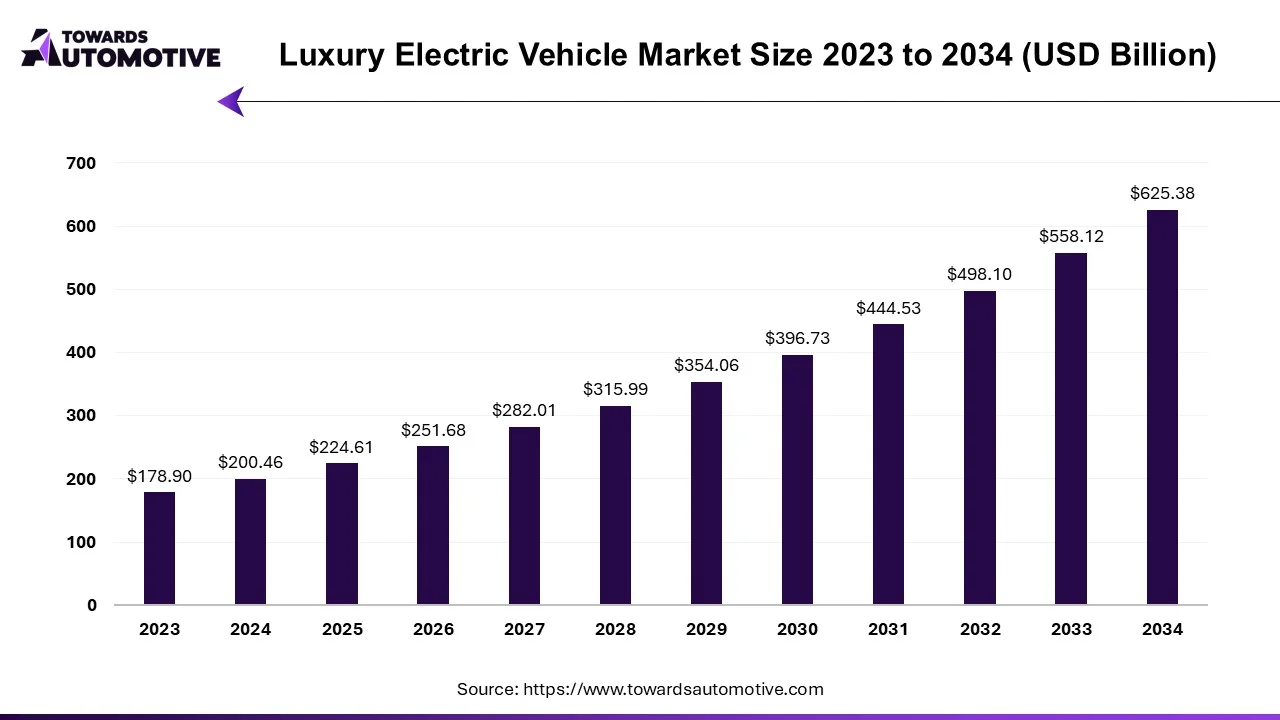
Luxury electric cars represent a fusion of innovation, sophistication, and environmental responsibility, embodying a commitment to cutting-edge technology and sustainability. In recent years, the allure of luxury electric vehicles has been steadily growing, propelled by their reputation as symbols of progress and environmental consciousness.
An exemplar of this trend is BMW Group India, which achieved record sales across its brands – BMW, MINI, and BMW Motorrad – between January and September 2023. Delivering 582 MINIs, 8,998 BMW cars, and 6,778 BMW motorcycles during this period, the luxury automaker showcased the increasing demand for premium electric vehicles in the Indian market. Additionally, endorsements from celebrities and influencers have bolstered the image of luxury electric cars, enhancing their appeal among discerning consumers seeking prestige and value.
Environmental concerns and stringent regulations have also been instrumental in shaping the trajectory of the luxury electric vehicle market. Rising environmental awareness and the imperative to combat climate change have prompted consumers to seek eco-friendly transportation alternatives. Governments worldwide are enacting stricter emissions standards and offering incentives to promote the adoption of electric vehicles, further driving the shift towards sustainable mobility.
For Instance,
Nevertheless, challenges persist, particularly regarding the affordability and accessibility of electric vehicle charging infrastructure, especially fast-charging stations. Concerns about range anxiety and the availability of charging facilities may deter some consumers from opting for luxury electric vehicles over conventional cars, underscoring the need for continued investment in charging infrastructure to alleviate these concerns and accelerate the transition to electric mobility.
Luxury electric cars represent a paradigm shift towards sustainable and technologically advanced transportation, driven by evolving consumer preferences, environmental imperatives, and government initiatives. As the luxury electric vehicle market continues to evolve, overcoming challenges and expanding charging infrastructure will be crucial in unlocking its full potential and shaping the future of mobility.
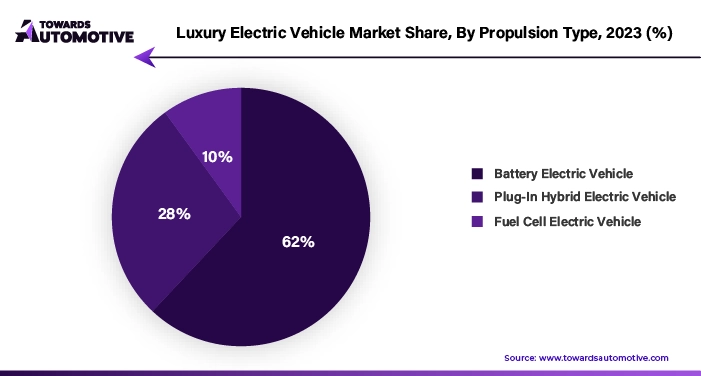
Based on the model, the sedan segment is projected to generate a higher number of jobs in 2022, influenced by various factors reflecting consumers' evolving preferences. These factors include a growing emphasis on sustainability and a transition towards eco-friendly transportation alternatives. Technological advancements within the electric vehicle sector are enhancing the appeal of luxury sedans by introducing new features and improving performance metrics. Moreover, government incentives and heightened awareness regarding environmental issues are driving up demand for luxury electric sedans. The amalgamation of sleek design, cutting-edge technology, and a commitment to reducing carbon emissions has positioned these vehicles as symbols of both luxury and environmental responsibility, thus fostering increased consumer interest and joint ventures within the market.
In terms of propulsion mode, it is anticipated that by 2022, pure electric vehicles powered by hybrid drivetrains will dominate over 58% of the luxury electric vehicle market, capturing the attention of discerning consumers. Despite lingering concerns surrounding battery technology and range limitations, government incentives and subsidies are poised to make electric vehicles more accessible and affordable. The escalating significance of sustainability and environmental consciousness, coupled with the inherently eco-friendly nature of electric cars and their association with prestige, have elevated pure electric vehicles to status symbols. As apprehensions regarding various stressors such as range anxiety diminish and the cost of ownership becomes more competitive, the environmentally conscious utilization of these upscale vehicles is further incentivized.
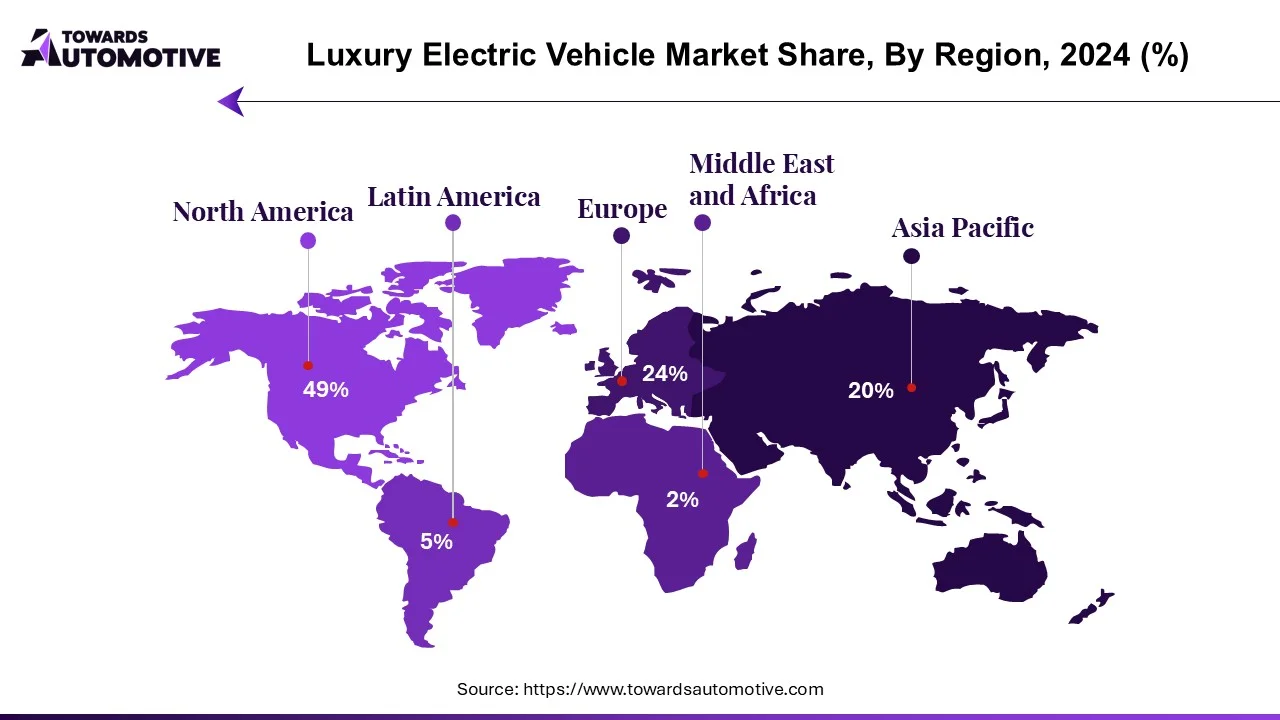
The North American luxury electric vehicle (EV) market is poised to capture a substantial 30% share of revenue by 2022. This robust growth is attributed to the unwavering consumer demand for high-end eco-friendly vehicles, which aligns with the region's escalating emphasis on sustainability and environmental consciousness. Government incentives and tax credits further bolster the appeal of energy-efficient products, rendering them increasingly attractive to both individual consumers and businesses alike.
Notably, established luxury automakers and emerging startups are making significant investments in North America to capitalize on the burgeoning market demand and establish a competitive foothold. This influx of investment underscores the region's pivotal role in driving innovation and shaping the future trajectory of the luxury electric vehicle industry.
Moreover, North America benefits from a well-developed charging infrastructure, which addresses many concerns associated with electric vehicle adoption, such as range anxiety. This robust infrastructure alleviates barriers to entry and enhances the overall accessibility and convenience of luxury electric vehicles for consumers across the region.
North America's tech-savvy and environmentally conscious consumer base serves as a key catalyst for the industry's growth. With a keen awareness of the environmental impact of their purchasing decisions, consumers in the region are increasingly gravitating towards sustainable transportation options, further propelling the expansion of the luxury electric vehicle market.
North American luxury electric vehicle market is poised for significant growth, driven by strong consumer demand, supportive government policies, robust investment, well-developed infrastructure, and a discerning user base. As the industry continues to evolve, North America is positioned to play a pivotal role in shaping the future of luxury electric mobility.
The global electric vehicle tires market is forecasted to expand from USD 26.81 billion in 2025 to USD 59.59 billion by 2034, growing at a CAGR of 9.28% from 2025 to 2034.
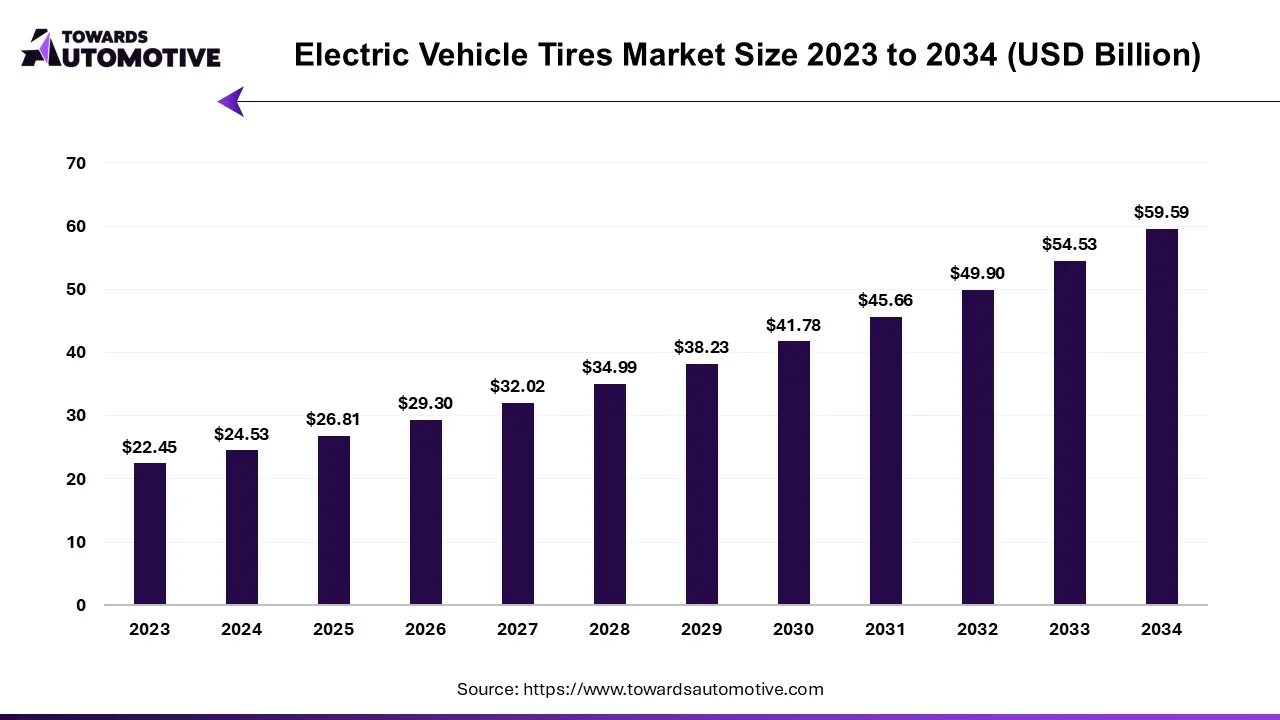
The electric vehicle tires market is a rapidly expanding segment within the automotive industry, driven by the growing adoption of electric vehicles worldwide. EV tires are specifically designed to meet the unique demands of electric vehicles, such as higher torque, heavier weight due to battery packs, and the need for improved energy efficiency to maximize range. These specialized tires play a crucial role in enhancing the overall performance, safety, and longevity of electric vehicles, making them an essential component in the EV ecosystem.
The electric vehicle (EV) charger cellular connectivity market is forecasted to expand from USD 2.07 billion in 2025 to USD 11.00 billion by 2034, growing at a CAGR of 20.38% from 2025 to 2034.
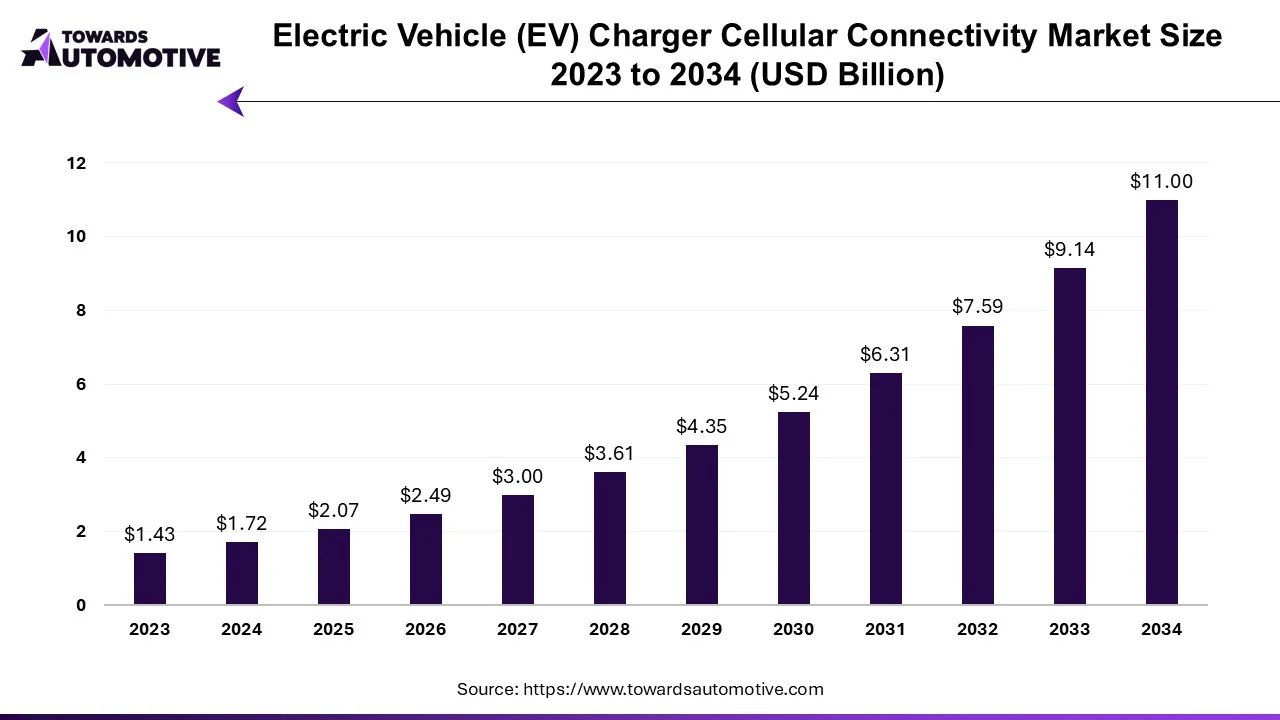
The electric vehicle (EV) charger cellular connectivity market is experiencing remarkable growth, driven by the global transition towards electric mobility, advancements in connectivity technologies, and the increasing demand for efficient charging infrastructure.
EV charger cellular connectivity plays a crucial role in enabling convenient, reliable, and intelligent charging solutions for electric vehicles, facilitating remote monitoring, data analytics, and energy management capabilities. Cellular connectivity allows EV chargers to communicate with central management systems, cloud platforms, and mobile applications, providing real-time status updates, billing information, and remote access for EV drivers, operators, and grid operators. By leveraging cellular networks, EV chargers offer enhanced interoperability, scalability, and efficiency, supporting the transition towards electric mobility and sustainable transportation solutions.
The electric vehicle connector market is forecasted to expand from USD 4.05 billion in 2025 to USD 16.91 billion by 2034, growing at a CAGR of 17.20% from 2025 to 2034.
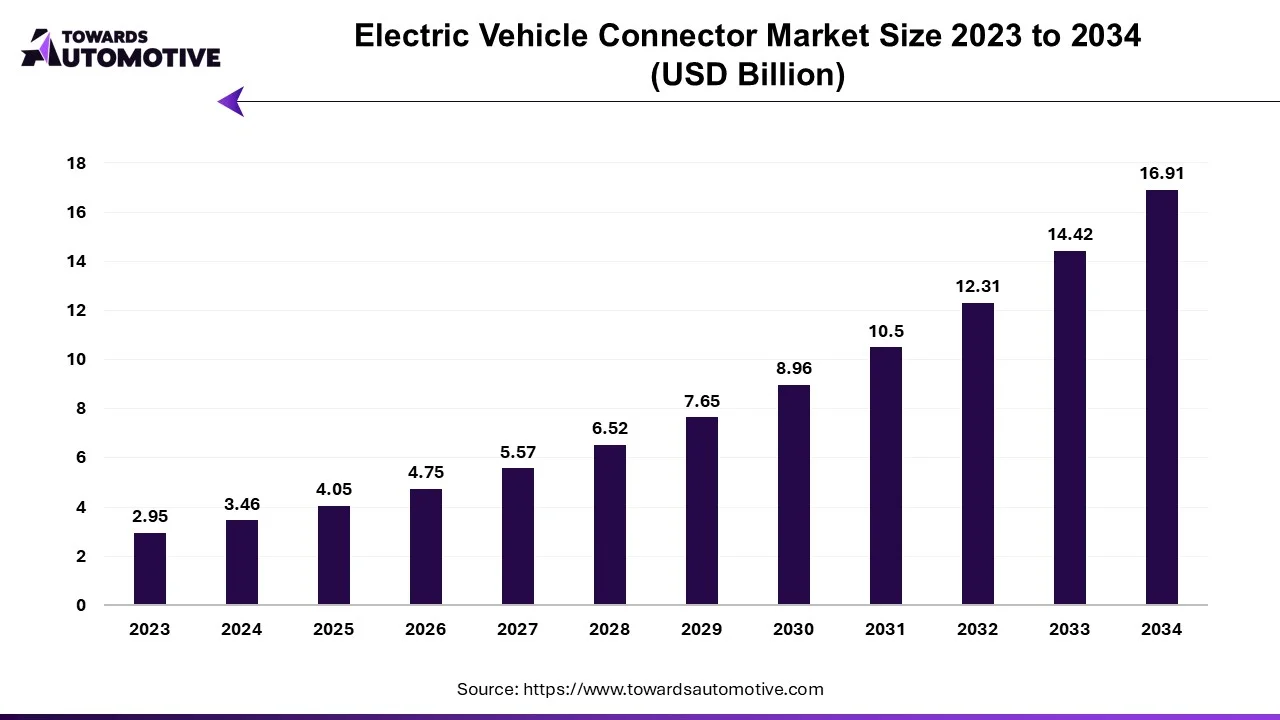
The electric vehicle connector market is experiencing significant growth as the demand for electric vehicles accelerates globally. EV connectors play a crucial role in ensuring efficient and reliable charging by establishing seamless connections between the vehicle and the charging infrastructure. As governments and industries focus on reducing carbon emissions and promoting sustainable transportation, the adoption of electric vehicles is increasing. This, in turn, drives the need for advanced EV connectors that can support faster, safer, and more efficient charging processes. These connectors come in various types, such as AC, DC, and wireless connectors, each catering to specific charging requirements.
The electric vehicle (EV) testing, inspection, and certification market is forecasted to expand from USD 4.65 billion in 2025 to USD 10.32 billion by 2034, growing at a CAGR of 9.25% from 2025 to 2034.
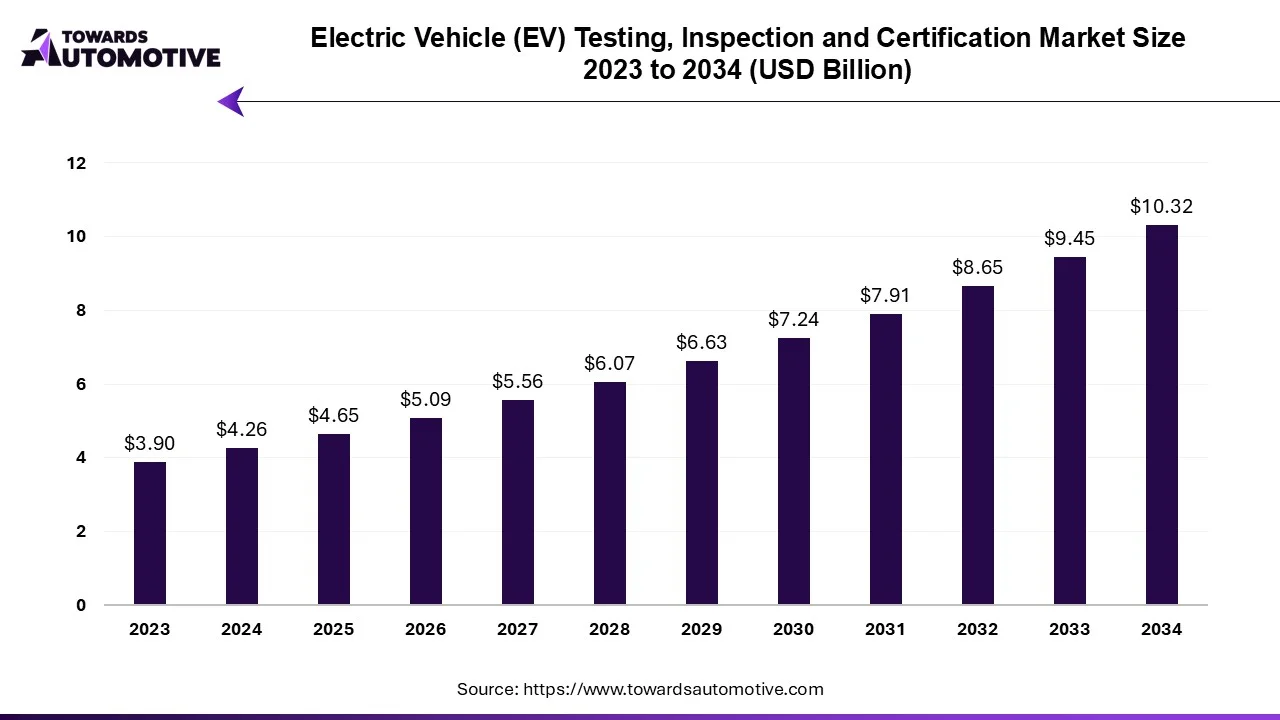
The electric vehicle (EV) testing, inspection, and certification market are witnessing significant growth, driven by the global transition towards electric mobility and the increasing adoption of electric vehicles across various segments. As governments and industry stakeholders prioritize sustainability, safety, and regulatory compliance, the demand for comprehensive testing, inspection, and certification services for EVs continues to rise.
The EV testing, inspection, and certification market factors such as stringent safety regulations, increasing consumer awareness, and the need to address range anxiety and infrastructure concerns associated with electric vehicles. As automakers and EV manufacturers strive to enhance vehicle performance, reliability, and safety, the demand for comprehensive testing and certification solutions continues to escalate.
The electric vehicle sensor market is expected to increase from USD 12.53 billion in 2025 to USD 50.98 billion by 2034, growing at a CAGR of 16.87% throughout the forecast period from 2025 to 2034. The increasing sales of EVs in developed nations for lowering emission coupled with numerous government initiatives aimed at developing the EV industry has driven the market expansion.
Additionally, rapid investment by EV brands for integrating advanced sensors in vehicles to monitor EV performance along with advancements in sensor technology is playing a vital role in shaping the industrial landscape. The research and development activities related to solid-state batteries is expected to create ample growth opportunities for the market players in the upcoming years.
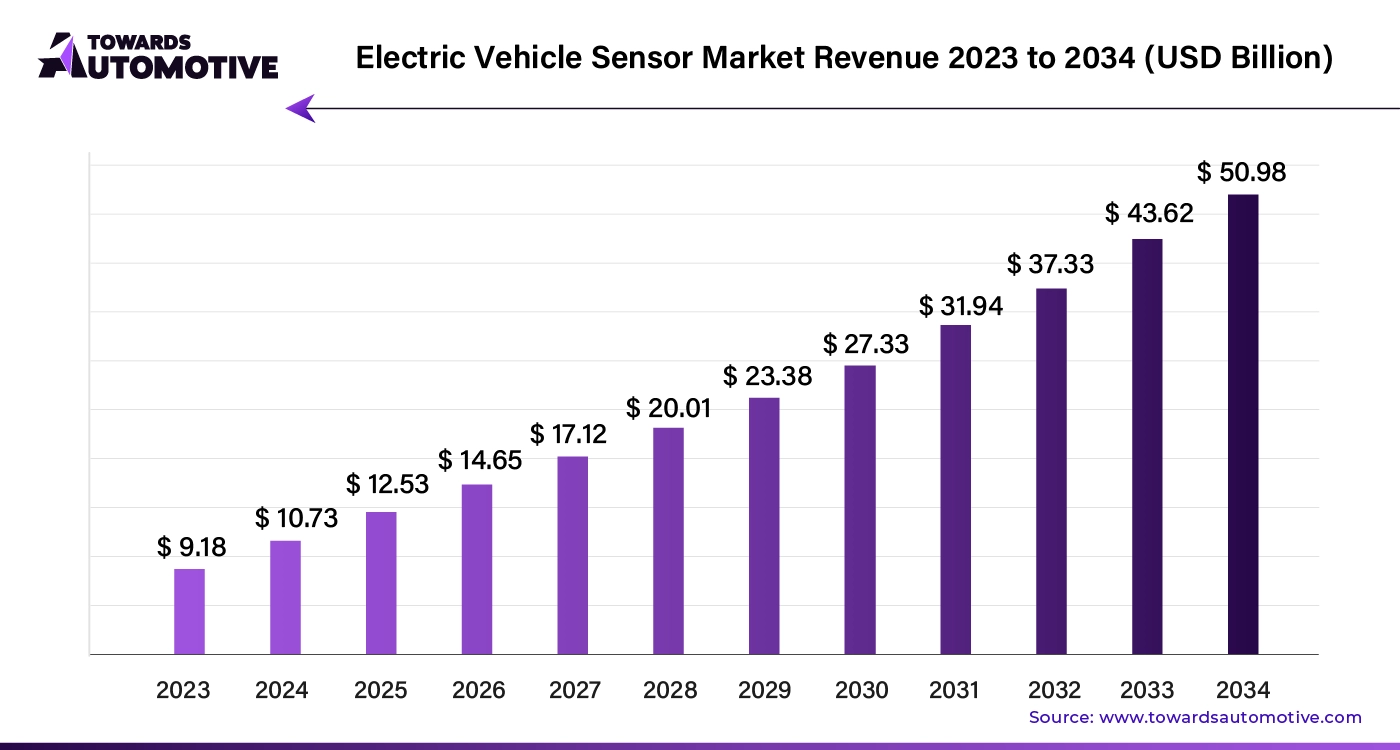
The electric vehicle sensor market is a prominent sector of the automotive industry. This industry deals in manufacturing and distribution of EV sensors around the world. There are numerous types of sensors developed in this sector comprising of temperature sensors, current/voltage sensors, position sensors, speed sensors, Lidar sensors, radar sensors and some others. It is used in various types of vehicles including passenger cars and commercial vehicles. These vehicles are powered by different propulsion technology consisting of BEV and HV. This market is expected to rise significantly with the growth of the EV sector in different parts of the globe.
The electric vehicle solar sunroof market is anticipated to grow from USD 3.67 billion in 2025 to USD 30.98 billion by 2034, with a compound annual growth rate (CAGR) of 26.62% during the forecast period from 2025 to 2034.
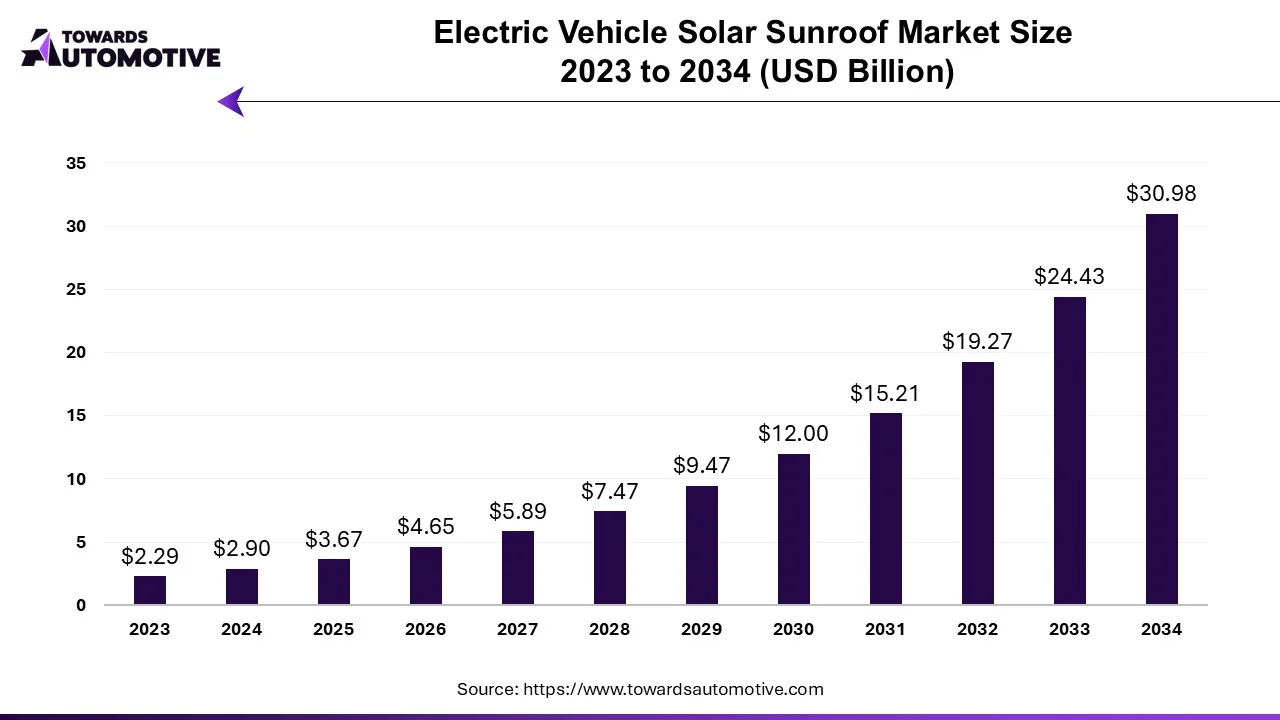
The electric vehicle solar sunroof market is a crucial sector of the automotive components industry. This industry deals in manufacturing and distribution of solar sunroof for electric vehicles. There are several types of sunroofs developed in this industry comprising of fixed solar sunroof, retractable solar sunroof, solar panel integrated sunroof and some others. These sunroofs are developed using numerous materials including microcrystalline silicon, polycrystalline silicon, thin-film solar cells and some others. It is designed for different vehicles including passenger electric vehicles and commercial electric vehicles. The growing sales of EVs in different parts of the world has contributed to the industrial expansion. This market is predicted to rise significantly with the growth of the electric vehicle industry.
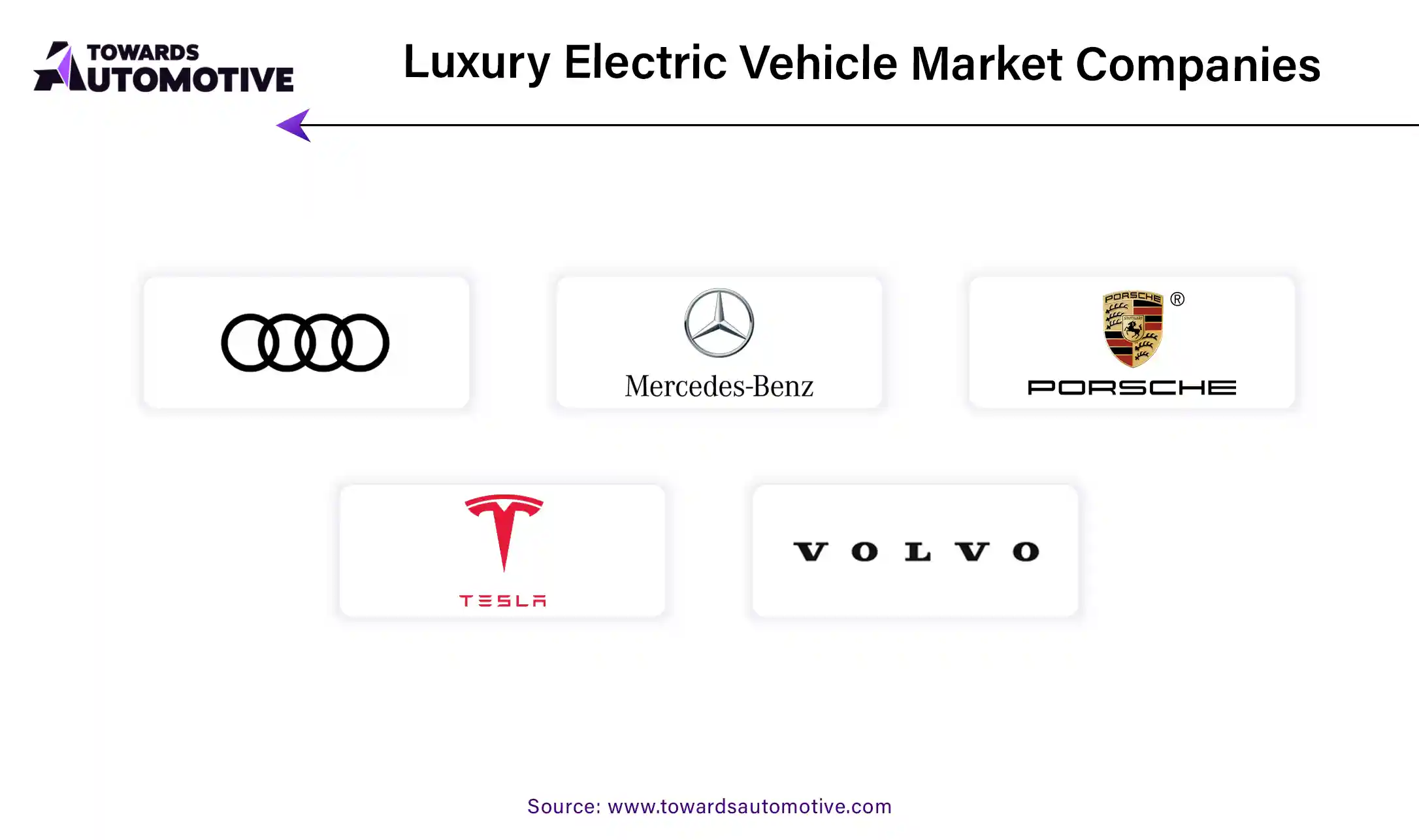
Tesla Inc. stands out as a dominant force in the luxury electric car market, boasting the largest market share and a reputation for innovation, advanced features, and high performance. One of Tesla's key strengths lies in its unwavering commitment to developing a robust charging infrastructure, exemplified by its extensive supercharger network. This network addresses a critical concern for electric vehicle (EV) buyers by alleviating range anxiety and enhancing the overall convenience of EV ownership.
Tesla's strategic focus on innovation serves as a cornerstone of its success in the luxury electric car segment. The company continually pushes the boundaries of automotive technology, introducing cutting-edge features and advancements that set it apart from competitors. From industry-leading battery technology to autonomous driving capabilities, Tesla's commitment to innovation drives its leadership position in the market.
Tesla's brand reputation is synonymous with quality, reliability, and forward-thinking design, further enhancing its appeal to luxury car buyers. The company's vehicles offer a compelling combination of performance, luxury, and sustainability, catering to discerning consumers seeking an elevated driving experience with minimal environmental impact.
Tesla's relentless pursuit of excellence, coupled with its pioneering approach to electric mobility, cements its position as a trailblazer in the luxury electric car segment. By prioritizing innovation, customer satisfaction, and sustainable transportation solutions, Tesla continues to shape the future of the automotive industry and inspire others to embrace the transition to electric mobility.
By Vehicle Type
By Propulsion Type
By Geography
October 2025
October 2025
October 2025
October 2025
We offer automotive expertise for market projections and customizable research, adaptable to diverse strategic approaches.
Contact Us